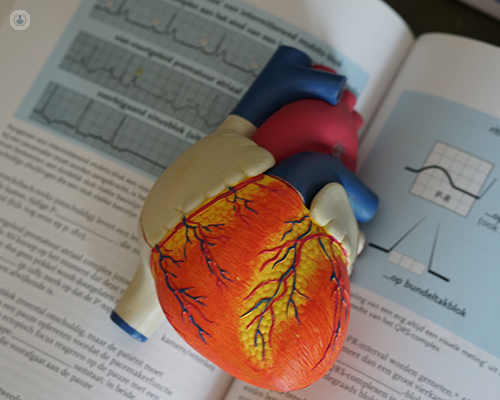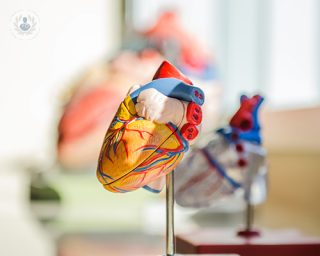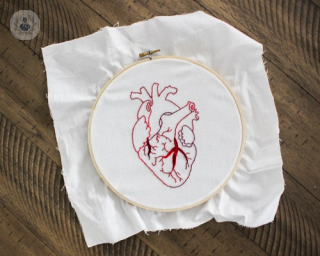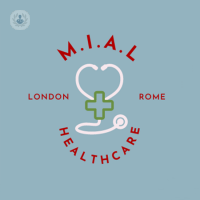Myocarditis
Dr Ahmed Elghamaz - Cardiology
Created on: 11-13-2012
Updated on: 05-05-2023
Edited by: Carlota Pano
What is myocarditis?
Myocarditis is an inflammation of the heart muscle, known as the myocardium. It can affect the heart muscle and electrical system. It reduces the heart’s ability to pump blood and produces abnormal or fast heart rhythms, which are known as arrhythmias.

Prognosis
Severe myocarditis can significantly weaken the heart, meaning the rest of the body isn’t supplied enough blood. Clots can form in the heart, and this can lead to a heart attack or a stroke.
What are the symptoms?
Symptoms vary according to the seriousness of the disease. In early stages, or if it is a mild myocarditis case, the patient may not have any symptoms, or they may be very mild. These may include difficulty breathing or slight chest pain.
In more severe cases, symptoms will vary depending on the cause of the myocarditis. The most common symptoms are:
- Chest pain
- Arrhythmias
- Shortness of breath when resting or exercising
- Fatigue
- Water retention: legs, ankles, and swollen feet
- Other symptoms resemble a viral infection: headache, joint pain, sore throat, fever or high temperature and diarrhoea, among others.
If a child has myocarditis, it is known as paediatric myocarditis. Symptoms include:
- Fever or high temperature
- Fainting
- Shortness of breath
- Fast breathing
- Arrhythmias, abnormal or fast heart rate.
Medical tests
Diagnosing myocarditis is not simple, as there are many diseases that have similar symptoms. When a patient goes to the appointment, the specialist may notice a rapid heartbeat or abnormal sounds when listening through the stethoscope. A physical exam can detect fluid in the lungs and leg swelling.
There may be signs of infection, fever, and rashes. An X-ray will show if there is any inflammation in the heart. The specialist may use an ECG (electrocardiogram) to diagnose the condition.
Other medical tests that can help diagnose myocarditis include:
- Blood cultures to detect infection
- MRI
- Cardiac catheterisation
- Blood tests for virus antibodies
- Myocardial, liver, and lung blood test
- Full blood count
- Heart biopsy
- Tests to check for a virus
What causes it?
The cause for myocarditis is not always obvious, but it is known that certain infections can trigger it, including viruses, bacteria, parasites, or fungi.
- Viruses: including adenovirus, hepatitis B and C, parvovirus, and herpes viruses. Gastrointestinal infections, mononucleosis, or German measles can cause myocarditis. It is also common in people with HIV.
- Bacteria: staphylococci, streptococci, dysentery-causing bacteria, and bacteria spread by ticks.
- Fungal: in people with weakened immune systems, yeast infections, aspergillus, or other fungi such as histoplasma, found in animal faeces.
Myocarditis may appear in people who have been exposed to:
- Radiation or chemical substances, such as carbon monoxide.
- Drugs: these could be medications that cause allergies in some people, such as cancer treatments, antibiotics such as penicillin, sulphonamide, anticonvulsants, or illegal drugs such as cocaine.
- Other diseases such as; lupus, giant cell arteritis, and Takayasu arteritis, among others.
How can it be prevented?
There isn’t a known way to prevent myocarditis, however the following guidelines can be taken to avoid infections that could increase the risk of myocarditis:
- Avoid people who have viral diseases until they have recovered
- Have good hygiene habits
- Avoid risky behaviour
- Avoid tick exposure
- Have vaccination records up to date.
What is the treatment?
Myocarditis can improve on its own, but often requires treatment before signs of improvement are seen. Myocarditis treatment depends on the symptoms and causes.
Treatment can include:
- Antibiotics
- Anti-inflammatory drugs
- Low salt diet
- Diuretics to get rid of excess fluid
- Intravenous immunoglobulin to fight infections.
There are treatments for cases in which a deficiency is causing heart failure or arrhythmias. If the heart is weak, medications can be prescribed to reduce its workload. These may include; angiotensin-converting enzyme inhibitors, angiotensin II receptor blockers, beta-blockers, and diuretics.
When treating severe myocarditis, a more aggressive form of treatment is often opted for, which may include:
- Intravenous drugs
- Ventricular assist devices
- Intra-aortic counterpulsation balloon
- Extracorporeal membrane oxygenation.
What specialist should I see?
The specialists who treat myocarditis are cardiologists, paediatric cardiologists, and cardiovascular surgeons.













